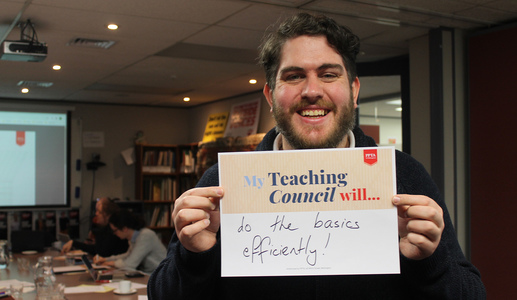Dear Minister Hipkins,
As changes to the Teaching Council’s certification process come into effect on February 1, 2021, the damage to teachers becomes a reality.
We, the undersigned, urge you to intervene to stop this harm. We ask you to:
1. Reverse the fees increases that came into effect on February 1st 2021 and develop a fair funding model for the Teaching Council
The fees are increasing by more than 100 percent. They are blanket fees which hit our most vulnerable teachers hardest – beginning teachers, part-time teachers, relief teachers, itinerant music teachers, and teachers who have financial commitments to their whānau and communities.
2. Remove the requirement for annual certification
The Teaching Council has also announced that teachers will need to be re-certified every year rather than every three years. This is a low-trust model that creates unnecessary workload for principals and teachers.
3. Change the Teaching Council legislation so that it focusses on fulfilling its core functions efficiently
We agree that teachers should be registered and held to high professional standards. However, the Teaching Council has expanded its remit into areas of professional development and leadership. As a result, teachers are required to pay increased fees for services they neither requested nor desire.
Teachers are also experiencing frustratingly long delays in having their registration and/or certification fulfilled. Confirmation of registration/certification is in some cases taking months to arrive; an issue which is becoming increasingly nerve-wracking for teachers who are still waiting for the certification as the year begins. They cannot legally be employed without it.
Changing the legislation to limit the Teaching Council to its core functions is a matter of fairness. If teachers must pay for their own registration and certification, they should not therefore be required to cover the costs of any and all activities that the Teaching Council undertakes.
Why is this important?
The teaching profession has been facing a supply crisis for a long time. Attracting and retaining quality teachers is paramount if we are going to maintain the high standards of teaching and learning that New Zealanders expect and deserve. The pressures of the job are already such that young graduates and those considering a career change feel they can earn better money and have a better work-life balance elsewhere. Having to cover the cost of a registration and certification personally – unlike nurses or social workers, for instance, whose registration costs are covered by their employers – is another barrier that the profession cannot afford.
Teachers deserve a Teaching Council that they can trust, and that trusts them. If we are to keep the profession to the world-leading standard that it is today, we must honour that with fair fees, a high-trust model of certification, and a Council that performs its core functions effectively and efficiently. Nothing more, and nothing less.


